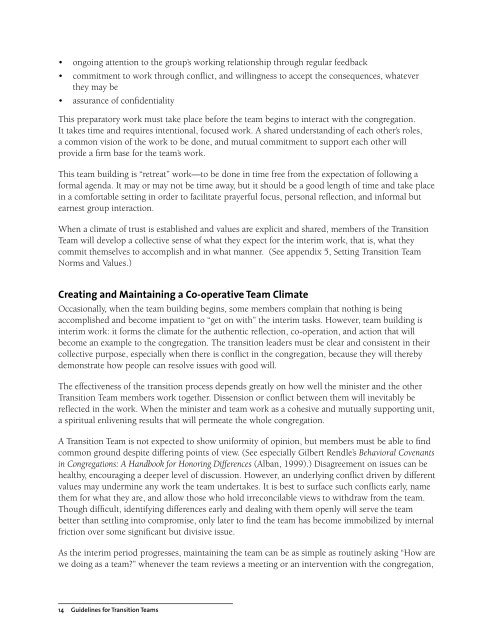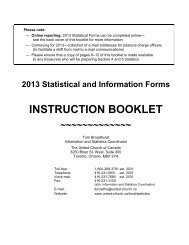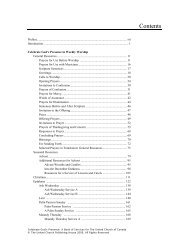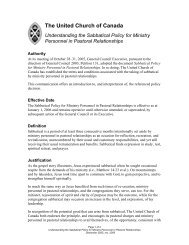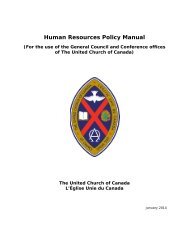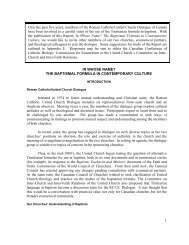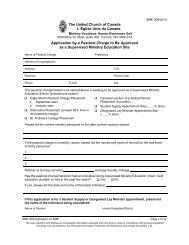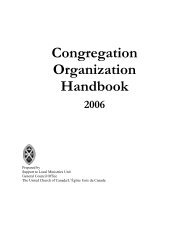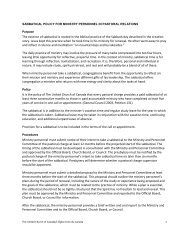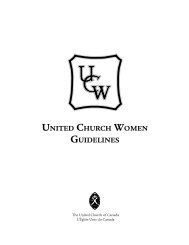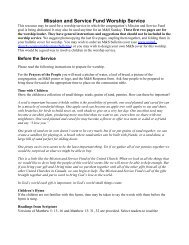Guidelines for Transition Teams - The United Church of Canada
Guidelines for Transition Teams - The United Church of Canada
Guidelines for Transition Teams - The United Church of Canada
Create successful ePaper yourself
Turn your PDF publications into a flip-book with our unique Google optimized e-Paper software.
• ongoing attention to the group’s working relationship through regular feedback<br />
• commitment to work through conflict, and willingness to accept the consequences, whatever<br />
they may be<br />
• assurance <strong>of</strong> confidentiality<br />
This preparatory work must take place be<strong>for</strong>e the team begins to interact with the congregation.<br />
It takes time and requires intentional, focused work. A shared understanding <strong>of</strong> each other’s roles,<br />
a common vision <strong>of</strong> the work to be done, and mutual commitment to support each other will<br />
provide a firm base <strong>for</strong> the team’s work.<br />
This team building is “retreat” work—to be done in time free from the expectation <strong>of</strong> following a<br />
<strong>for</strong>mal agenda. It may or may not be time away, but it should be a good length <strong>of</strong> time and take place<br />
in a com<strong>for</strong>table setting in order to facilitate prayerful focus, personal reflection, and in<strong>for</strong>mal but<br />
earnest group interaction.<br />
When a climate <strong>of</strong> trust is established and values are explicit and shared, members <strong>of</strong> the <strong>Transition</strong><br />
Team will develop a collective sense <strong>of</strong> what they expect <strong>for</strong> the interim work, that is, what they<br />
commit themselves to accomplish and in what manner. (See appendix 5, Setting <strong>Transition</strong> Team<br />
Norms and Values.)<br />
Creating and Maintaining a Co-operative Team Climate<br />
Occasionally, when the team building begins, some members complain that nothing is being<br />
accomplished and become impatient to “get on with” the interim tasks. However, team building is<br />
interim work: it <strong>for</strong>ms the climate <strong>for</strong> the authentic reflection, co-operation, and action that will<br />
become an example to the congregation. <strong>The</strong> transition leaders must be clear and consistent in their<br />
collective purpose, especially when there is conflict in the congregation, because they will thereby<br />
demonstrate how people can resolve issues with good will.<br />
<strong>The</strong> effectiveness <strong>of</strong> the transition process depends greatly on how well the minister and the other<br />
<strong>Transition</strong> Team members work together. Dissension or conflict between them will inevitably be<br />
reflected in the work. When the minister and team work as a cohesive and mutually supporting unit,<br />
a spiritual enlivening results that will permeate the whole congregation.<br />
A <strong>Transition</strong> Team is not expected to show uni<strong>for</strong>mity <strong>of</strong> opinion, but members must be able to find<br />
common ground despite differing points <strong>of</strong> view. (See especially Gilbert Rendle’s Behavioral Covenants<br />
in Congregations: A Handbook <strong>for</strong> Honoring Differences (Alban, 1999).) Disagreement on issues can be<br />
healthy, encouraging a deeper level <strong>of</strong> discussion. However, an underlying conflict driven by different<br />
values may undermine any work the team undertakes. It is best to surface such conflicts early, name<br />
them <strong>for</strong> what they are, and allow those who hold irreconcilable views to withdraw from the team.<br />
Though difficult, identifying differences early and dealing with them openly will serve the team<br />
better than settling into compromise, only later to find the team has become immobilized by internal<br />
friction over some significant but divisive issue.<br />
As the interim period progresses, maintaining the team can be as simple as routinely asking “How are<br />
we doing as a team?” whenever the team reviews a meeting or an intervention with the congregation,<br />
14 <strong>Guidelines</strong> <strong>for</strong> <strong>Transition</strong> <strong>Teams</strong>


